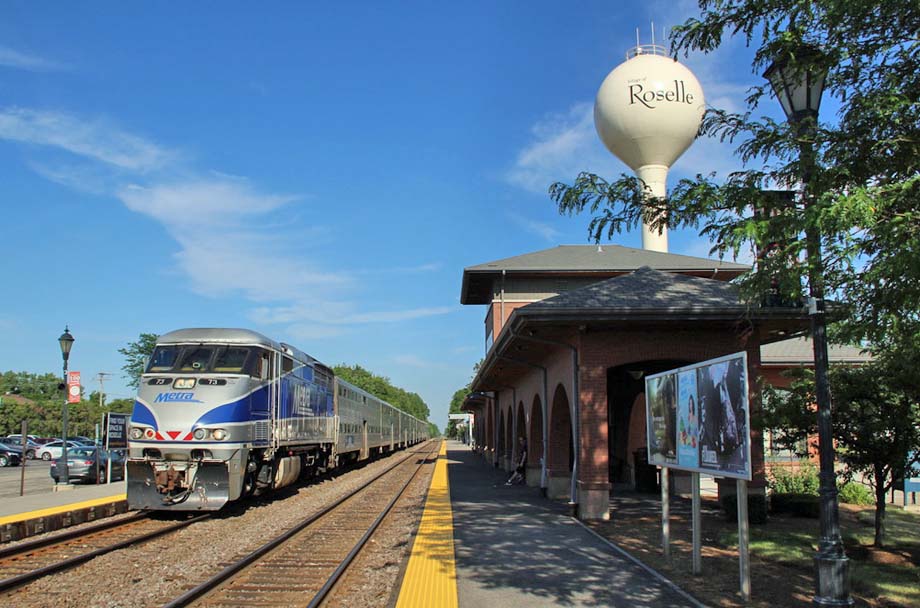
Washington District of Columbia USA - Canadian Pacific believes concerns by Chicago's Metra over
its proposed merger with Kansas City Southern are largely unfounded, based on erroneous analysis, and involve
unreasonable requests for conditions to the merger.
But for all that, CP says it is committed to supporting Metra operations and improving its relationship with the
commuter agency.
The response to Metra is part of its three-volume, 4,374 page document filed Wednesday by CP and KCS, responding to
filings by other parties regarding its amended merger application before the Surface Transportation Board.
Metra's filing in March opposed the CPKC merger, saying it would create significant service delays, and asked that the
STB impose conditions including transfer of dispatching control of shared lines to the commuter operator, as well as an
extensive list of infrastructure improvements.
The CPKC document also responds to the demands of a group of Chicago suburbs for massive infrastructure expenditures,
characterizing them as unreasonable and excessive.
The CPKC filing is highly critical of traffic modeling by outside Metra consultants, calling their work
"irredeemably flawed" and "so riddled with errors that it is demonstrably incapable of modeling the
status quo."
Metra earlier this week had to file a correction to its earlier document with the STB, noting that an estimate of the
potential for a 1,200 percent increase in train delays should instead have used a figure of 299 percent.
CP and KCS also say that, contrary to Metra's contentions, the merger will not result in "meaningful
increases" in freight traffic on lines shared with Metra, that the Milwaukee District-West line has ample capacity
to handle the anticipated increase in freight, and that CP demonstrably performs well in its dealings with
Metra.
The filing also says many of the infrastructure improvements sought by Metra as conditions to a merger are physically
impossible, and that its request for dispatching control of lines shared by CP and Metra "would create more issues
than it resolves."
However, the filing also says "CP's senior leadership, from CEO Keith Creel on down, is commited to cooperation
with Metra so that the needs of both railroads and their customers can be met."
Creel, in a statement included in the CPKC filing, says the Metra comments reveal CP needs "to work harder to
build a relationship of trust" with the commuter operator.
As part of the effort to do so, Creel says he has contacted Metra CEO Jim Derwinski, and that other CP personnel
"have communicated extensively with their counterparts at Metra."
And, with that relationship in mind, Creel says CP is "willing to provide concrete commitments that protect
Metra's operations over and above what our contracts require." These include:
- Not forcing CPKC freight trains between Kansas City and St. Paul to operate on lines shared with Metra, except in
emergency detour situations;
- Not objecting to Metra's resumption of its full pre-COVID schedules on those lines;
- A commitment to work with Metra on improved real-time communications about dispatching decisions that might have an
impact on Metra trains;
- Supporting collaborative assessments of proposed Metra operating changes outside of peak periods, when Metra needs CP
consent to add trains;
- And committing to a process to avoid or resolve disputes when Metra believes CP has created performace issues for its
commuter train.
"Nothing in the record," the filing contends, "contradicts the simple truth that CP leadership has been
and remains comittedf to supporting Metra's operations and honoring CP's obligations to dispatch Metra's trains well,
with our without the merger."
Suburban Coalition Derided for Overreaching Infeasible Requests
While the CPKC filing takes more than 70 pages to examine Metra's contentions in detail, it dismisses the contentions
of the Chicago suburbs of the Coalition to Stop CPKC in little more than five pages.
The conditions sought by those communities, it says, are "simply untenable and disproportionate to any possible
impact" of the merger, and are "not only overreaching, but also infeasible."
Those eight communities, along the route shared by CP and Metra's Milwaukee District West line, are seeking more than
US$9 billion in improvements to mitigate a traffic increase estimated by CP at eight trains a day.
As an example, the CPKC filing cites the suburbs' proposal to prevent any additional freight traffic on the western
edge of the Elgin Subdivision "and to find other routings for such traffic."
CP and KCS says this would "cut the CPKC network off from the rail network at and beyond Chicago" and force
lengthy reroutes "spanning hundreds of unnecessary miles, traversying dozens of other communities, and resulting
in a myriad of additional costs and emissions. This is quintessential "not in my backyard", never mind the
impact on the public as a whole."
While the board has previously required railroads to consult with communities in cases where mergers brought modest
increases in freight traffic, CP and KCS say that is not justified in this case, since the railroads have already
consulted with the communities, "and it is clear that no reasonable, mutually acceptable mitigation is
available."
Author unknown.
(likely no image with original article)
(usually because it's been seen before)
provisions in Section 29 of the Canadian
Copyright Modernization Act.
